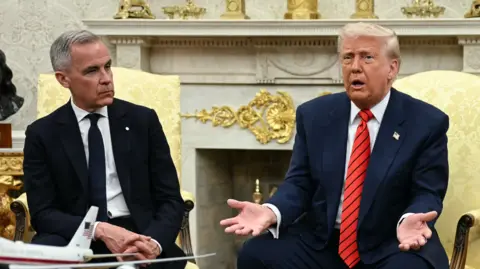White House says Canada’s Carney ‘caved’ to Trump on tech tax

The White House said Canadian Prime Minister Mark Carney “caved” to pressure from President Donald Trump in rescinding a tax on big US technology firms.
White House Press Secretary Karoline Leavitt told reporters on Monday Canada had made a mistake in trying to levy the tax, and that Carney called Trump on Sunday evening to say he would drop it.
Since Trump returned to office, the two countries have been fighting over trade. In response to the tax, which he called a “blatant attack”, Trump on Friday called off trade deal negotiations and threatened to raise tariffs.
Canada then said it would halt collection of payments, which were due on Monday, and introduce legislation to scrap the tax.
“President Trump knows how to negotiate, and he knows he is governing the best country and the best economy in this world,” Leavitt said in response to a question from a reporter.
“Every country on the planet needs to have a good relationship with the US,” she said, and called removal of the tax a “big victory for our tech companies and our workers here at home”.
Canada’s digital services tax (DST) would have meant US tech giants including Amazon, Meta, Google and Apple faced a 3% charge on Canadian revenue above $20m (£15m).
On Sunday, Canada’s finance minister, François-Philippe Champagne, issued a statement saying the tax would be rescinded.
“The DST was announced in 2020 to address the fact that many large technology companies operating in Canada may not otherwise pay tax on revenues generated from Canadians,” he said.
“Canada’s preference has always been a multilateral agreement related to digital services taxation,” the statement added.
Pierre Poilievre, the leader of Canada’s opposition Conservative Party, criticised scrapping the tax at the “11th hour”.
In a post on X, he said the prime minister had “put his elbows down” – in reference to the “elbows up” phrase used by Carney and his Liberal Party when campaigning in this April’s election to signify they were prepared to defend Canadian interests against the US.
Poilievre urged Carney to “insist that the US immediately rescind softwood lumber tariffs” in exchange, adding that “we need to make gains for our workers in these talks”.
Many countries, including the UK, are changing how they tax large multinational technology firms, which have millions of customers and advertisers around the world, but high corporation tax bills due to the way their businesses are structured.
It was estimated that Canada’s tax would cost the tech giants more than C$2bn ($1.5bn; £1.06bn) in its first year as the tax was being applied retroactively to January 2022.
Last year’s federal budget estimated the tax would bring in C$5.9bn in total over the next five years.
Comments (0)